German Language Beginners Guide

This guide was written for German beginners that don’t know where to start learning the German language. Take the time to learn with this German language guide and let these points soak in, then build on them as you continue your German studies.
Good luck, and have fun learning German.
Why Learn the German Language?
The German language is known by an estimated 140 Million across Europe and around the world.
German is tied with French as the most learned second language in the European Union.
The importance of German as playing a crucial role for centuries in Europe and on the world stage.
German Language Beginners Outline
Contents
German Dialect Map
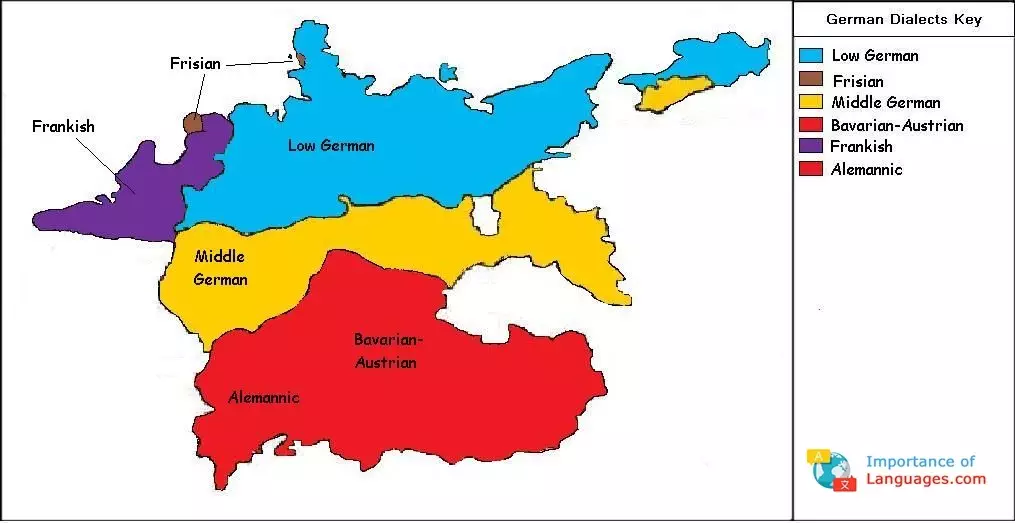
Within any language or language group, there may be significant changes in speech, vocabulary, and pronunciation. The term used to describe these changes is called a dialect.
Some words or phrases that exist in one dialect may exist or be absent from different German dialects. A Few German Dialects exist today because of various German dialects merging together through German history. German Dialects
- Low German
- Frisian German
- Middle German
- Frankish German
- Alemannic German
- Bavarian-Austrian German
Different German dialects of the German language are spoken in many different nations and regions around the world, most commonly throughout Europe.
German Language Alphabet
Learning to read the German Alphabet should be the first stop for German beginners.
The German Alphabet has four more letters than the English Alphabet and different pronunciation too.
The German alphabet is part of Germanic language that’s origins trace back to early 700s. German contains the twenty-six letters of the English alphabet and adds the extra letters ä, ö, ü and ß. All German letter have upper and lowercase version except for ß. The letter ß will never be at the start of a word.
German is sometime viewed by non-native German speakers as a harsh sounding language. The German language is a more consistent phonetically language than English.
Learn German Alphabet Pronunciation
Some German Letters are pronounce way different then their English counterparts. For example, the German W sounds like English V, and German V sounds like the English F. Most of the time the S in German sounds like Z in English when placed at the beginning of a word followed by a vowel. Learn German Alphabet letters g, ch, and r are pronounce mostly in the back of the throat. The pronunciation of some of these German letters does not have an English counterpart (Like “ü” for example”).
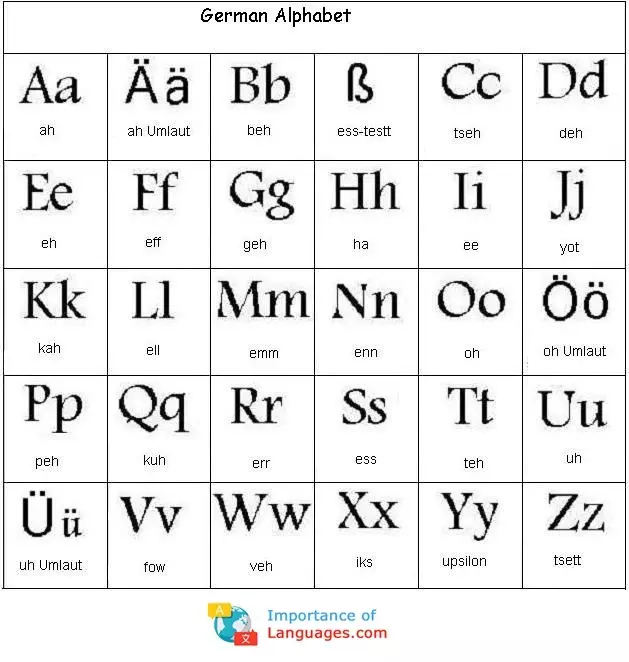
German Number System
German numbers are easy to understand because they are written exactly like English Numbers but are pronounced differently. Understanding how to write German numbers should take very little time and effort to learn.
It’s actually pretty straightforward when it comes to learning how to use the German number system. Pronouncing German numbers on the other hands get a little bit tricky. German numbers 1 to 10 should be your primary focus when you begin. German numbers after gain a suffix added to the base number. To illustrate what I mean, here are German numbers 1 to 100.
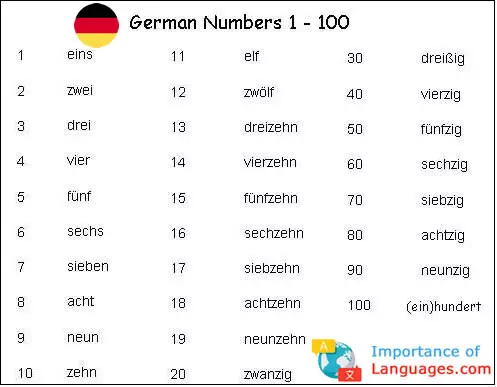
German Numbers 1 to 100
| German Vocabulary for Numbers | ||
| Zero | Null | |
| One | ein | |
| Two | zwei | |
| Three | drei | |
| Four | vier | |
| Five | fünf | |
| Six | sechs | |
| Seven | sieben | |
| Eight | acht | |
| Nine | neun | |
| Ten | zehn |
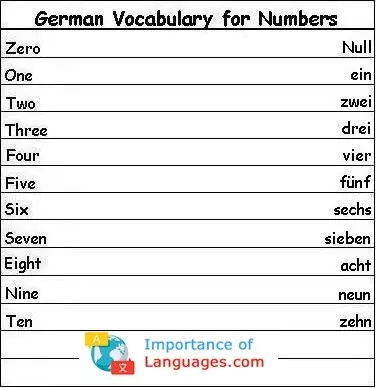
German Numbers beginning at ten through nineteen gain the suffix “zehn” added to the base number. German numbers from 13-19 work like this. However, the number twenty adds und- to the mix. So it goes base number + und + the appropriate suffix. Example of how to write the pronunciation of German numbers below.

Understanding how to write German numbers is really that simple to learn. Only takes an hour or two to fully memorizes the German number system.
German numbers are just alike English numbers except for different pronunciation
German Vocabulary and Phrases
Logical next step for German beginners after learning the German Alphabet would be to start developing your German vocabulary with German words and phrases.
Learning German grammar rules can be considered the cornerstone of the language and will take some time to learn but creates a sturdy foundation to help you completely learn German in no time.
German Grammar
The German grammar rules you must follow and understand to properly speak the German language.
German Grammer Rules:
- German sentence structure follows a Subject-Verb-Object pattern.
- German Nouns can be either masculine, feminine, and neuter.
- German Nouns and Pronouns are always capitalized.
- German Verbs have different endings to the words depending on which tense of the word is used.
- German Adjectives vary depending on which gender and case of the noun they are describing.
More German Grammar Rules
The fun part of learning any language.. learning Grammar!
German Grammar Rules: Sentence Structure
German Sentence structure as 4 distinct cases that can potentially follow.
- Nominative case
Identifies the subject (who or what is doing the action). - Accusative case
Identifies the direct object (whom or what the subject “verbs”). - Genitive case
Indicates that this noun belongs to someone or something. - Dative case
identifies the indirect object (the receiver of the object or an action.)
German Grammar Rules: Nouns and Pronouns
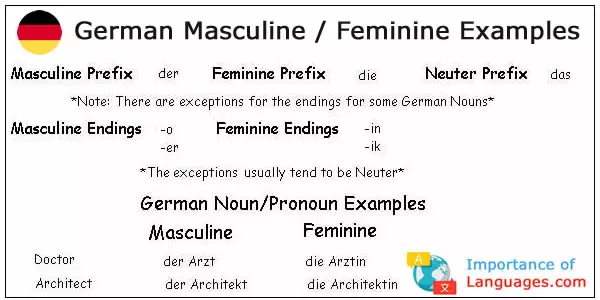
• German Nouns can be either masculine, feminine, and neuter. German Nouns and Pronouns are always capitalizes.
• Masculine and Feminine don’t always apply to how “manly” or how “female” the subject is.
• Masculine nouns usually include male people and animals, the seasons, and months of the year.
German Grammar Rules: Verbs
• German Verbs have different endings to the words depending on which tense of the word is used.
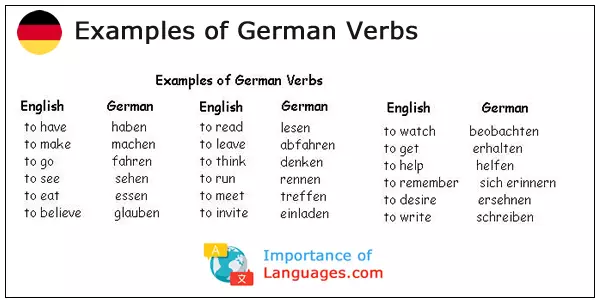
German Grammar Rules: Adjectives
• German Adjectives vary depending on which gender and case of the noun they are describing.
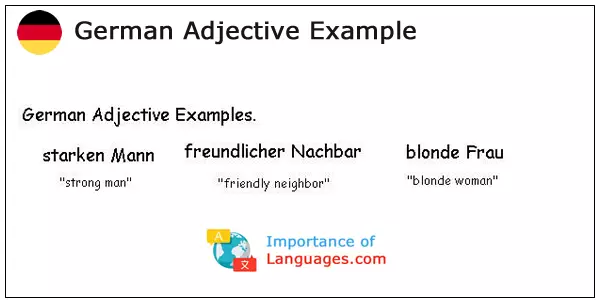
Learn Common German Phrases
Help you Around German Countries
If you ever play to visit a country where the primary spoken language is German, then knowing and being able to use common German phrases. Even though English is gradually becoming the most used language in international business in some situations. Speaking the language of the locals and talking to the people. It shows respect and an effort to their culture by just knowing a few common German phrases.
In any language, you should be able to greet people and introduce yourself or simply ask for help or directions. German greeting and phrases to start or end conversations. Being able to introduce yourself in German. Being able to say your “Sorry” or ask politely for someone to repeat themselves. Common German words and phrases like saying “yes’ and “no”
Most of the sentences below can be used for travel and daily life conversations. So they might come handy if you memorize and practice then. The following is a list of common German phrases that you may need to know in the German language:
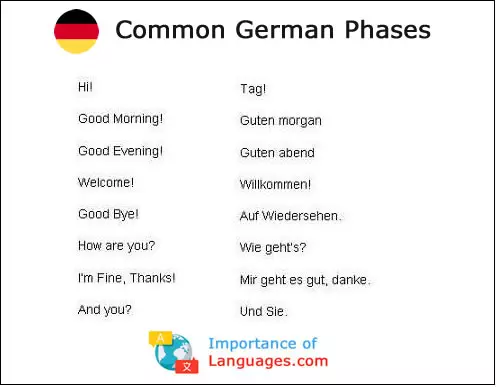

| German Compliments/Flirting | ||
| You’re so handsome! | Du bist so schön! | |
| You’re very beautiful. | Du bist sehr schön. | |
| I love your smile. | Ich liebe dein Lächeln. | |
| You have beautiful eyes. | Du hast schöne Augen. |
Learn Common German Words
I hope you find this page of common German phrases useful in your travels. Memorizes them and try to incorporate them into your daily conversation
| German Vocabulary Words for Weather | |
| Rain | Regen |
| Snow | Schnee |
| Fog | Nebel |
| Cloudy | bewölkt |
| Sunshine | Sonnenschein |
| Cold | Kälte |
| Warm | warm |
| Windy | windig |
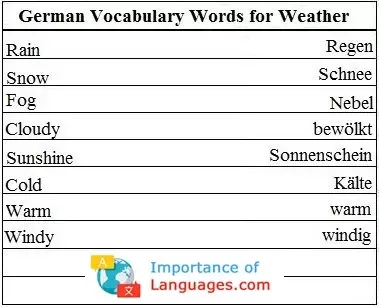
| German Vocabular Words for Vehieles | |
| Car | Auto |
| Truck | LKW |
| Plane | Flugzeug |
| Boat | Boot |
| Van | Lieferwagen |
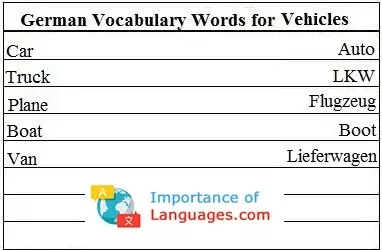
| German Vocabulary for Tmes/Day | |
| Today | heute |
| Tomorrow | morgen |
| Vesterday | gestern |
| Tonight | heute Abend |
| Morning | Morgen |
| Afternoon | Nachmittag |
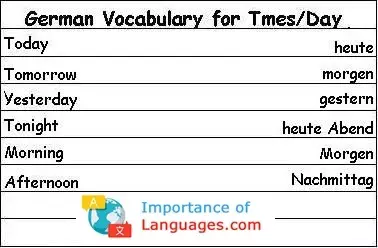
| German Vocabulary for Seasons/Year | |
| Spring | Frühjahr |
| Summer | Sommer |
| Autumn | Herbst |
| Winter | Winter |
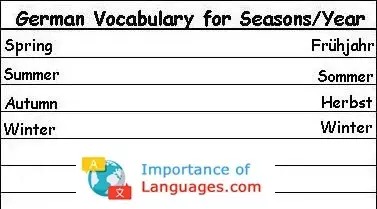
| German Vocabulary for Professions | |
| Doctor | Arzt |
| Lawyer | Anwalt |
| Dentist | Zahnarzt |
| Writer | Schriftsteller |
| Banker | Banker |
| Secretary | Sekretär |
| Engineer | Ingenieur |
| Farmer | Bauer |
| Carpenter | Zimmermann |
| Architect | Architekt |
| Postman | Briefträger |
| Pilot | Pilot |
| Teacher | Lehrer |
| Cook | kochen |
| Mechanic | Mechaniker |
| Bartender | Barmann |
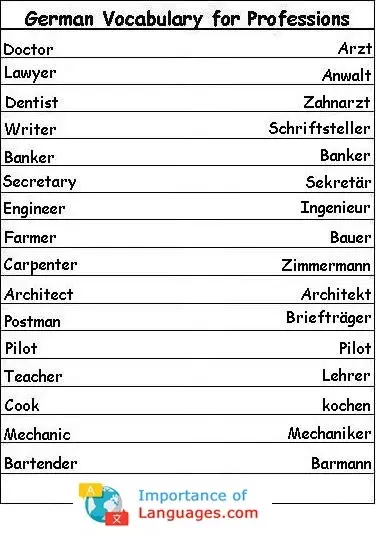
| German Vocabulary for Months/Year | |
| January | Januar |
| February | Februar |
| March | März |
| April | April |
| May | Mai |
| June | Juni |
| July | Juli |
| August | August |
| September | September |
| October | Oktober |
| November | November |
| December | Dezember |
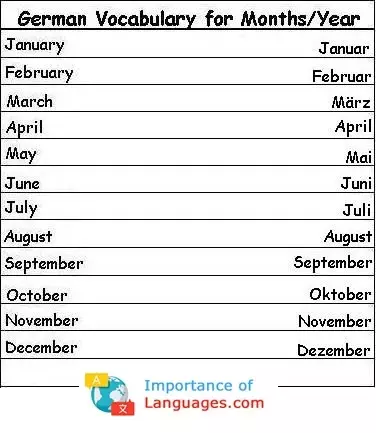
| German Vocabulary for Meal times/Food | |
| Breakfast | Frühstück |
| Lunch | Mittagessen |
| binner | Abendessen |
| Coffee | Kaffee |
| Fish | Fisch |
| Milk | Milch |
| Onion | Zwiebel |
| 5alad | Salat |
| Beverage | Getränk |
| Tea | Tee |
| Cake | Kuchen |
| Sausage | Wurst |
| Cheese | Käse |
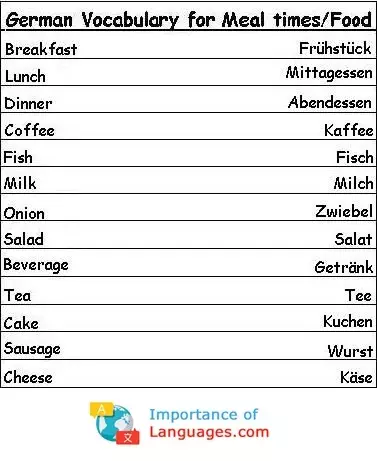
| German Vocabulary Words for Anatomy | |
| Head | Kopf |
| Heart | Herz |
| Brain | Gehirn |
| Lungs | Lunge |
| Hands | Hände |
| Legs | Legs |
| Arms | Waffen |
| Chest | Brust |
| Fingers | Fingers |
| Toes | Toes |
| Eyes | Blick |
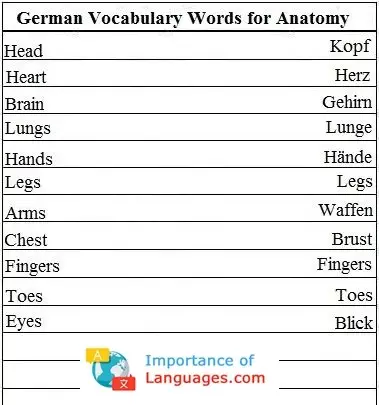
| German Vocabulary for Animals | |
| Dog | Hund |
| Cat | Katze |
| Fish | Fisch |
| Bird | Vogel |
| Pig | Schwein |
| Cow | Kuh |
| Monkey | Affe |
| Deer | Hirsch |
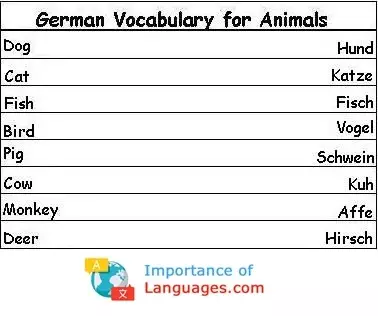
| German Vocabulary for Colors | |
| Black | schwarz |
| White | weiß |
| Yellow | gelb |
| Orange | orange |
| Blue | blau |
| Brown | braun |
| Green | grün |
| Purple | lila |
| Violet | violett |
| Red | rot |
| Gray | grau |
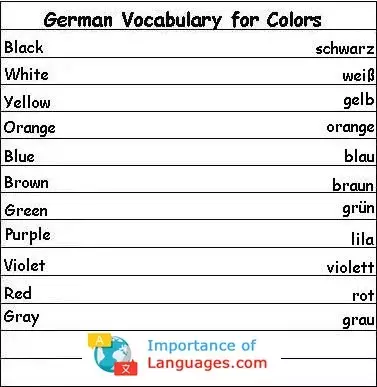
| German Vocabulary Nords for Continents | |
| Aftica | Afrika |
| Antarctica | Antarktika |
| Asia | Asien |
| Australia | Australien |
| Eurasia | Eurasien |
| Europe | Europa |
| North America | Nordamerika |
| South America | Südamerika |
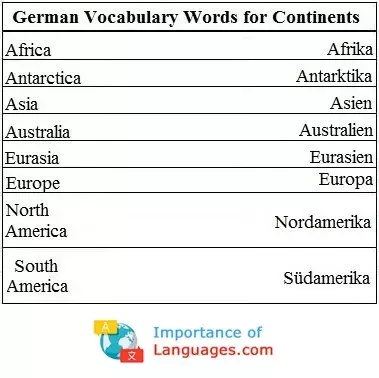
| German Vocabulary Nords for Countries | |
| China | China |
| France | Frankreich |
| Italy | Italien |
| North Korea | Nordkorea |
| South Korea | Südkorea |
| USA | Vereinigte Staaten |
| Britain | Großbritannien |
| Russia | Russland |
| Japan | Japan |
| Canada | Kanada |
| Iraq | Irak |
| Egypt | Ägypten |
| Germany | Deutschland |
| India | Indien |
| Spain | Spanien |
| Mexico | Mexiko |
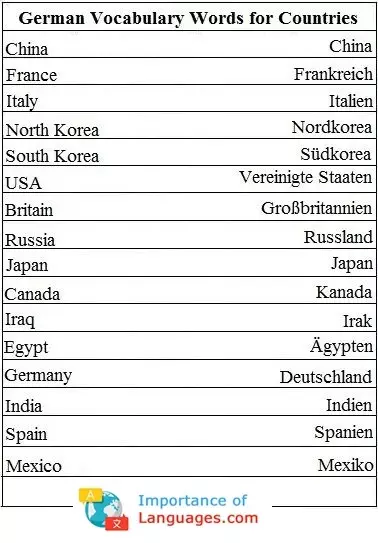
| German Vocabulary for Emotions/Feelings | |
| Love | lieben |
| Worried | besorgt |
| Angry | wütend |
| sad | traurig |
| Embarassed | peinlich |
| Afraid | ängstlich |
| Kind | Art |
| Happy | glücklich |
| Impolite | unhöflich |
| Painful | empfindlich |
| Bored | gelangweilt |
| Tired | müde |
| Sensitive | schmerzhaft |
| Beautiful | schön |
| Delighted | erfreut |
| Amazed | erstaunt |
| Hate | hassen |
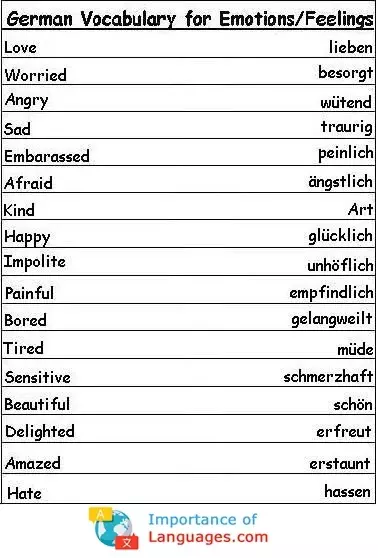
| German Vocabulary for Family Members | |
| Family | Familie |
| Father | Vater |
| Mother | Mutter |
| Grandfather | Großvater |
| Grandmother | Großmutter |
| Grandson | Enkel |
| Granddaughter | Enkelin |
| Grandparents | Großeltern |
| Grandchildren | Enkelkinder |
| Brother | Bruder |
| Sister | Schwester |
| Son | Sohn |
| Daughter | Tochter |
| Uncle | Onkel |
| Aunt | Tante |
| Nephew | Neffe |
| Niece | Nichte |
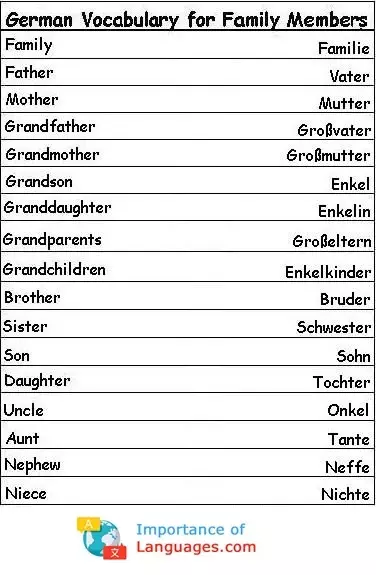
| GermanVocabularyWords for Homes/Rooms | |
| Home | Zuhause |
| House | Haus |
| Apartment | Wohnung |
| Dining Room | Dining Room |
| Bedroom | Schlafzimmer |
| Bathroom | Bad |
| Basement | Keller |
| Living Room | Wohnzimmer |
| Attic | Dachboden |
| Kitchen | Küche |
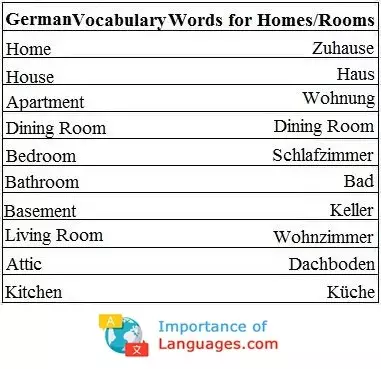
| German Vocabulary for Days/ Week | |
| Sunday | Sonntag |
| Monday | Montag |
| Tuesday | Dienstag |
| Wednesday | Mittwoch |
| Thursday | Donnerstag |
| Friday | Freitag |
| Saturday | Samstag |
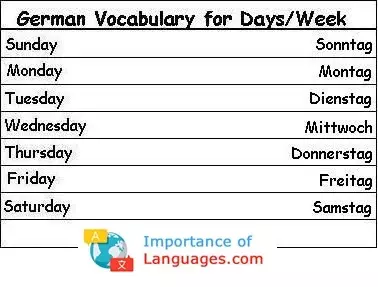
Consider Using an Online German Language Course

If you are really serious about learning German and want to maximize your time then you should consider using a German language course to further aid you in your quest to learn German. There are several great programs out there that deliver a great language learning experience. The advantages of a language learning program are the organization and having a next step already lined up.
Most break down the lessons into 30-minute intervals that can fit into any type of schedule. Flexible to retry a lesson to make sure you understand what you are learning and give you confidence in succeeding.
Examples of great Online German language programs can be found below.


Hi Madam,
I wish to learn how to speak Jerman, if possible teach me it.
Regards
Sajeev
Sajeev,
Try learning German from a local German School / Teacher.. or Try an Online German language program / App like:
http://www.rosettastone.com
http://www.duolingo.com
http://www.busuu.com
Good luck with your German
Sally
I think you meant to say nett instead of Art for the translation of kind. There are two types of kind in English ,kind meaning type (Art) and kind meaning to be kind (nett). I am no linguist by any means, but I am fluent in German.
Thanks for the tips.. we will update the site
A very helpful and informative article about German language. Thanks for sharing.I really appreciate your research.
I found your site on Pinterest. I am learning German on Duolingo. I am Afrikaans speaking and I am completely fascinated by what I find in every sentence. My daughter is a linguist and she explained to me that many of the older Germaanic forms were kept intact when it is found in a word like Die Speisekarte. Spys refers to food but is used in an idiomatic way: spys en drank, spyskaart. There are plenty of false friends.
I was saying to my daughter that when you know both Afrikaans and English really well, they are like the two railway lines on which the train (which is German) travels. You constantly recognise both applications of words in German. Eg. Die nächste Zug.. Immediately it sounds like naaste (which means nearest) but no, it’s like English, next. Really. It is so interesting.